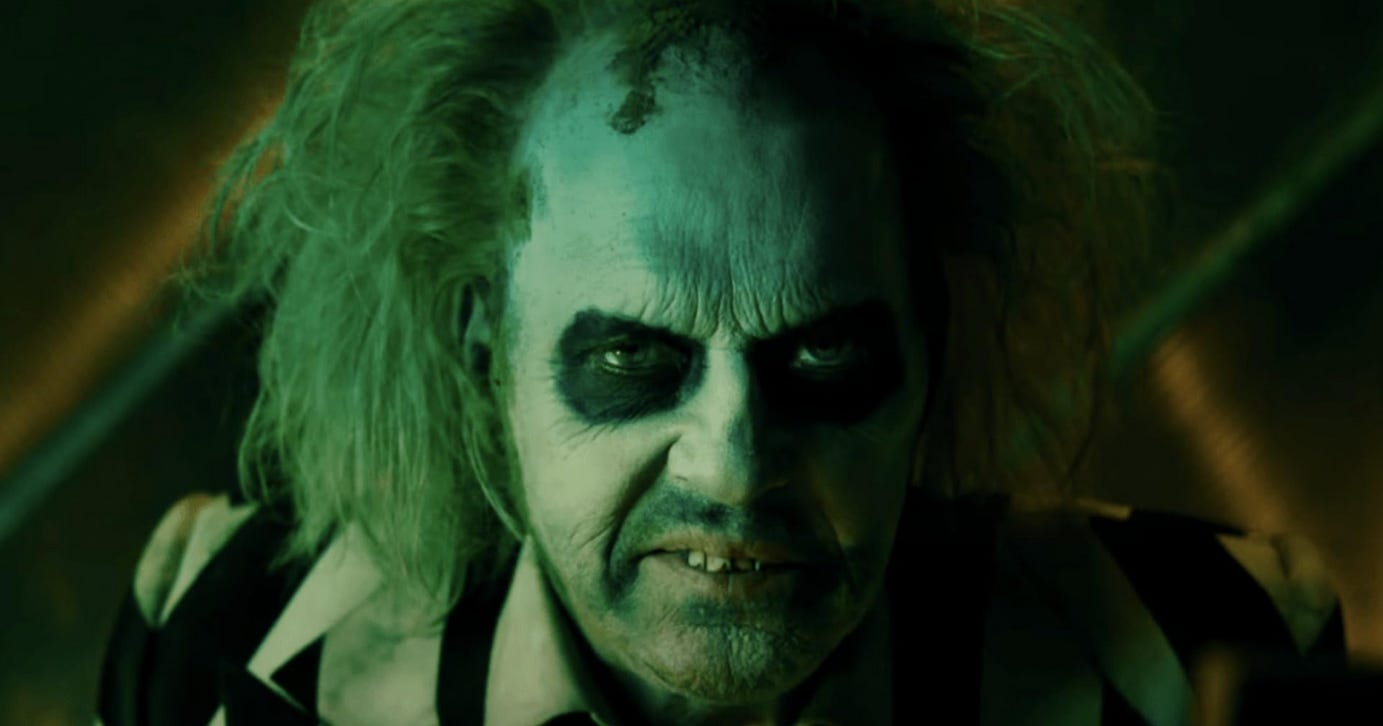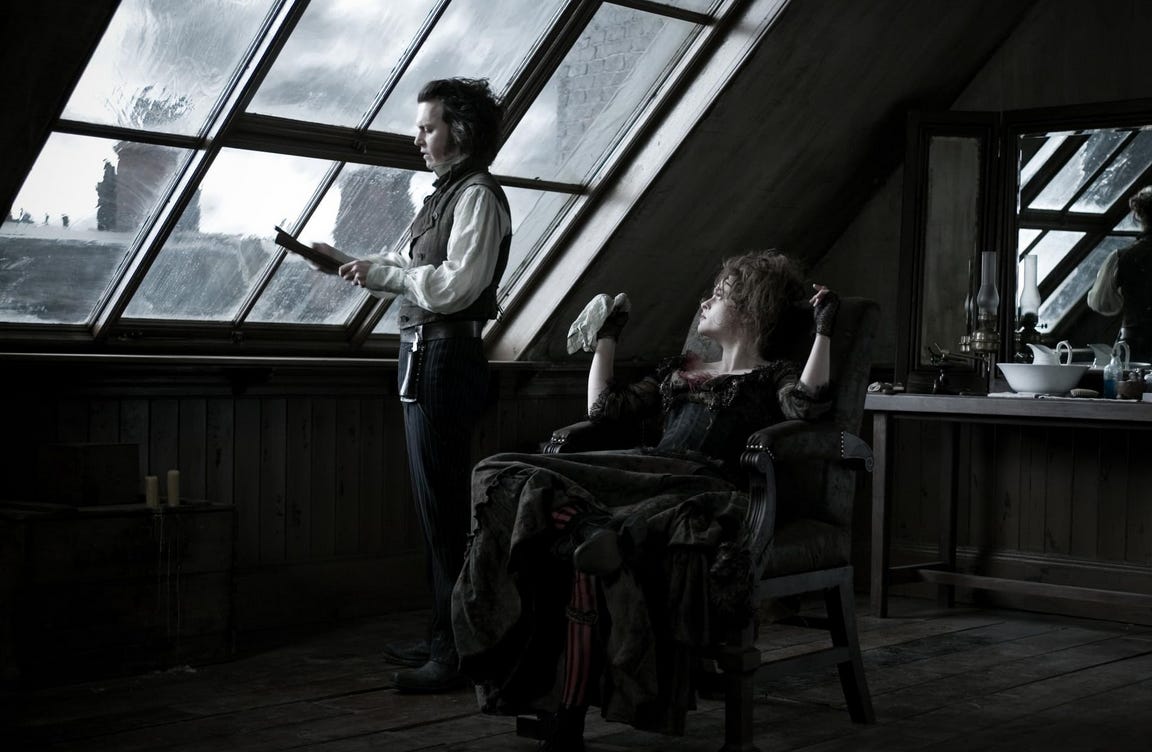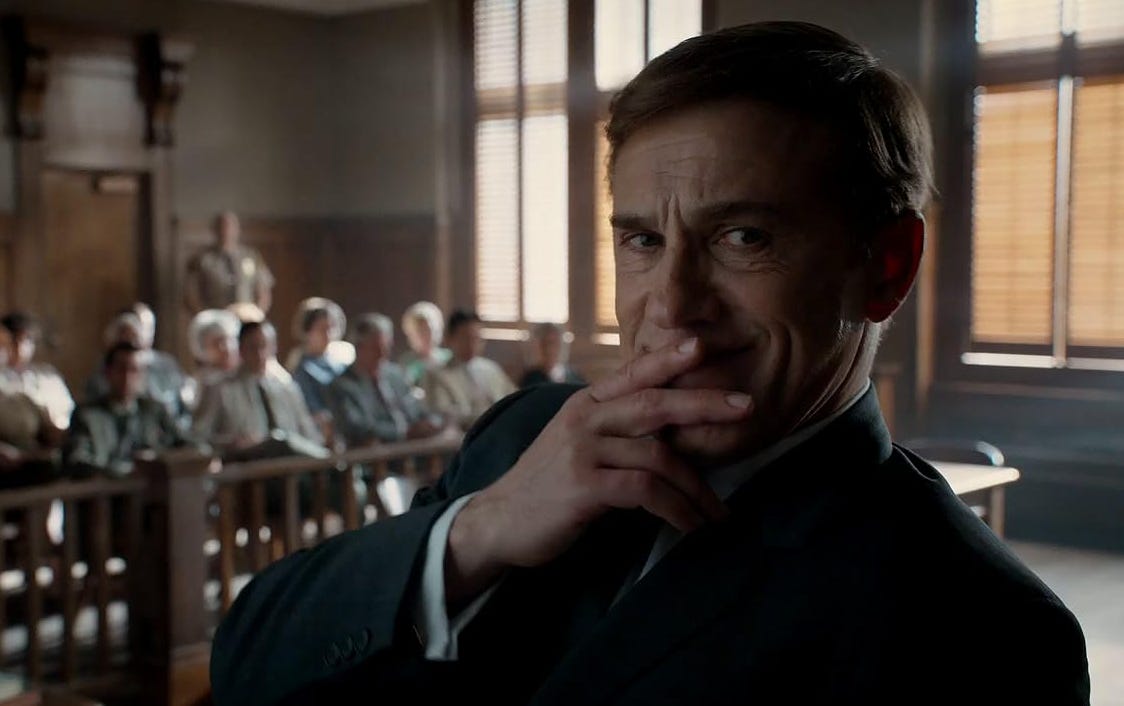Space Invader: Let Burton Be Burton
The strange journey of a iconic director.
The Tip Sheet has spun off. Introducing Space Invaders, a newsletter about movies and pop culture that invades this space on Saturday. Arrives irregularly during this pilot phase.
If there’s one thing that Film Twitter loves, it’s a sweep, those directors who come out of the box with a decade-long run of bangers that show a creative range that they’re never able to match in their own careers and is only sometimes matched by other big-name filmmakers.
Tim Burton is one of those. His feature directorial debut in 1985 with Pee Wee’s Big Adventure was followed by Beetlejuice, Batman, Edward Scissorhands, Batman Returns, The Nightmare Before Christmas (which he produced, not directed), Ed Wood, and Mars Attacks! Although it floundered at the time, Mars Attacks! has always had a constituency of dedicated fans, and the director himself rebounded quite quickly with Sleepy Hollow at the end of the century.
But since the turn of the millennium, Burton’s career has gone over some dizzyingly high peaks and through some disappointingly low valleys. He’s enjoyed some incredible commercial successes and has found wonderful material that he used to express his own idiosyncratic sense of commercial goth-ness, but there have also been times when those two things worked at cross purposes. There have been times in the last 24 years where Burton has been creatively strong but financially vulnerable, and other times where he’s made a bank, but seems creatively bankrupt.
That brings us to Burton’s latest film, Beetlejuice Beetlejuice, which seems like another example of the latter with the director revisiting a popular movie 36 years later in the hopes of a big payday (that he seems likely to secure). Given Burton’s success and influence in the last four decades, this is a good time to ask an important question: Why, after all this time, did Tim Burton find his way back to Beetlejuice?
In 2001 there was Planet of the Apes, which, I confess, I kinda like. The movie is a hot mess, mostly because they worked backward from the release date through development, but you can’t say that it doesn’t have style. Rick Baker’s ape make-up effects have yet to be matched, even with the state-of-the-art motion-capture tech in the most recent Apes films, but where the move falls flat is how grossly outmatch human Mark Wahlberg is by all the ape players including Tim Roth, Helena Bonham Carter, Michael Clarke Duncan, Cary-Hiroyuki Tagawa and Paul Giamatti. Mock, if you will, the “twist” ending, but there was no way Burton would outdo the original on that score, so you can hardly blame him for trying just the same.
Although it was critically maligned, Burton’s Planet of the Apes made money, which let him move on to something entirely different, Big Fish. Based on Daniel Wallace’s novel of the same name, the film is a touching story about fathers and sons, and how we reckon with the ways our parents are not the people we want them to be. Big Fish is the overlooked successor to Edward Scissorhands in terms of tone and style, a fairy tale rooted in magical realism, but whereas Edward venerates the outsider status of its hero, Burton dares to suggest in Big Fish that you can go home again and find peace there.
Charlie and the Chocolate Factory marked an important point in Burton’s career because it reunited him with Johnny Depp, then fresh off becoming a verifiable box office phenomenon thanks to Pirates of the Caribbean. Moving to Charlie after Big Fish, and teaming with an ascending Depp to do it, seems right out of the “one for me, one for them” playbook, but it’s remarkable the complete lack of a lasting footprint that this movie made despite its financial success. Even the recent prequel, Wonka, ignores the remake to embrace the mythology and style of the original Gene Wilder film.
Charlie was one of two Burton films that came out in 2005, the other was the animated Corpse Bride. Based on a 17th century folk tale, the film might best be described as a gothic romantic farce, where the marriage of Victor and Victoria is interrupted when the nervous Victor rehearses his wedding vows on a tree that’s the unmarked grave of a slain bride. Featuring the voice talents of Depp and Bonham Carter, plus other Burton regulars, Corpse Bride blended the ghoulish with the innocent in order to tell a story that was profoundly dark in the details but still accessible, a modern-day Grimm fable. Burton would also direct a stop-motion, full-length remake of his short film Frankweenie in 2012.
Burton’s two 2005 films would solidify a partnership that would govern the next several years of his output, if it was a Burton movie then it starred Depp and Bonham Carter.
In 2007, Burton adapted Sweeney Todd: The Demon Barber of Fleet Street, the classic 1979 musical by Stephen Sondheim based on a Victorian era story about a barber who gets revenge on the judge who ruined his life with the help of a baker. One might see why the material would appeal to Burton with all the throat cutting and cannibalism, but at least it plays into all his best creative instincts. Even the casting of the two main leads, not exactly known for their musical talents at the time, was a challenge that exceeded expectations.
But Sweeny Todd was a commercial and creative peak for the Burton trio, even though his next film broke the bank. Alice in Wonderland, released just a few months after Avatar, caught the 3D rival wave to a billion dollars, but it’s hard to watch it years later and not see how this movie is “patient zero” for all of Disney’s worst tendencies in the last decade: I.P. focused, bloated budget, big stars, and so much green screen and CG that your eyes go into a diabetic coma. Despite the talent on screen including Anne Hathaway, Matt Lucas and Crispin Glover (not to mention the voice talents of Michael Sheen, Alan Rickman, Christopher Lee and more), Alice feels like a parody of a Tim Burton movie at best, and a rip-off of the American McGee video game version of Alice at worst.
The final collaboration between Burton, Depp and Bonham Carter (for now?) was Dark Shadows, an adaptation of the short-lived (in daytime TV terms) gothic ABC soap about the Collins family, who are literally and figuratively haunted by their past when family patriarch Barnabis Collins, a vampire, returns home after 200 years.
With vampires, werewolves, ghosts and witches, it’s easy to see the Burton appeal, but Dark Shadows dives into some very non-Burton-y things like faith in the strength of blood ties, nostalgia for the idyllic past, and the celebration of crass commercialism. No one who venerates the works of Ed Wood or enjoys the depravity and sadism of the Mars Attacks! trading cards should find it heart-warming to watch the Collinses revive the family canning business and then celebrate with an Alice Cooper (playing himself) concert.
It's hard to transfer a campy winky soap opera into an extravagant summer blockbuster-style movie, and Burton couldn’t get there either. Like Alice, Dark Shadows feels like something Burton had to do, that it was material just waiting for him to leverage his talents and bring it to life, which is another way of saying that there was no challenge for the filmmaker. If these movies feel bored, it’s because the man behind the camera certainly seemed like it, and for that matter, so did his two stars in front of the camera.
But there was a saving grace to Dark Shadows, one of the players was doing her darnedest to inject life into the film. It shouldn’t be surprising that Eva Green would find currency with Burton, much of her acting work leaned into her ability to play dangerously alluring and unconventionally quirky under her movie star sex appeal. She moves seamlessly from being the woman who ruins James Bond in Casino Royale to something more independent like the steampunk world of Franklyn.
Green would become the focus of the next two live-action Burton films, Miss Peregrine’s Home for Peculiar Children and Dumbo, but these are perhaps Burton’s weakest efforts to date. Coming at the tail end of the YA adaptation trend, Miss Peregrine feels like an also-ran from the jump with its convoluted plotting, time loops and focus on world building; it’s not surprising that it’s based on a book because it feels like you need to have read the book to understand it. As of Dumbo, Burton reckons with the monster he helped create, but nearly 80 years after the release of the animated original, there was little cultural cache in a remake of Dumbo, even with the on-screen reunion of Micheal Keaton and Danny DeVito for the Burton fanatics.
What’s interesting about Burton’s output in the last 24 years is that his best film might be the least Burton-esque. Big Eyes, based on the real-life story of Margaret and Walter Keane, has none of the trappings of a Tim Burton movie though many of his usual collaborators were still taking part (at least behind the camera).
Re-teaming with Ed Wood screenwriters Scott Alexander and Larry Karaszewski, Big Eyes is a story about art and commerce, and who gets the credit when something’s a success. It’s about standing up for oneself, even if that means standing up to someone who claims to love you, and it’s about how bad guys often wear a smile and appear supportive. It’s a movie that focuses on nuanced performances, not gimmicks, and it’s probably Christoph Waltz’s best work in the last 10 years as you follow Walter’s arc from being an art-loving knight in shining armour to a rank con artist who thinks he can outsmart a federal judge by playing Perry Mason in a real courtroom.
Big Eyes is the work of a man struggling with himself and his place in the world he helped create; Jaws may have launched the era of the summer blockbuster, but Burton refined it in 1989 with Batman. It’s interesting that one of the main characters in Big Eyes is the art critic John Canaday (played by the late, great Terence Stamp), who was no fan of Margaret Keane’s big-eyed people in real-life either. Like many art critics, Canaday viewed anything popular in the harshest possible terms, and it's possible that this is the voice that Burton hears in his head. Tim Burton is the populist face for the likes Terry Gilliam or David Lynch, directors who also traffic in the macabre and the misunderstood but are never given the same rope as Burton because he makes millions. Has he been a fraud this whole time?
It's interesting then that Burton would now retreat into what was once popular from his own oeuvre because there have been decades of failure when it comes to creating a sequel to Beetlejuice. What makes the conditions so favourable now, and is there something here beyond the well-worn formula of familiarity and nostalgia that appeals to the director? I guess we will find out. Welcome home, Tim.
Beetlejuice Beetlejuice is now in a theatre near you.
The Bookshelf:
Coraline (Tues, Thurs)
Longlegs (Sat-Sun)
Sing Sing
Starting Friday: The Critic
Galaxy Cinemas – Woodlawn:
Afraid (till Wed)
Alien: Romulus
Beetlejuice Beetlejuice
Deadpool & Wolverine
Despicable Me 4 (Sat-Sun)
Deaner ‘89
The Front Room
It Ends with Us
The Matrix – 25th Anniversary
Ninja Scroll – 30th Anniversary (Wed-Thurs)
The Spongebob Movie: Sponge on the Run (Sat)
Stree 2 (till Tues)
Twisters
Starting Thursday: Speak No Evil
Galaxy Cinemas – Clair:
Temporarily closed due to flood damage.
Mustang Drive-In (open weekends):
Beetlejuice Beetlejuice (early show)
Trap (late show)
Princess Cinemas – Twin:
Between the Temples
Didi
Sing Sing
Strange Darling
Princess Cinemas – Original:
Donnie Darko (Sat, Tues, Thurs)
Electric Lady Studios: A Jimi Hendrix Vision (Sun, Wed)
Made in England: The Films of Powell and Pressberger (Sat-Sun, Tues)
My Penguin Friend (Sat, Mon, Wed)
Paris, Texas – 40th Anniversary (Sun, Thurs)
Strange Darling (Sat)
Starting Friday: The Straight Story – 4K Restoration
Apollo Cinema:
The Crow (Sat-Mon, Thurs)
Cuckoo (Sat-Sun)
Friday the 13th: The Final Chapter (Friday)
The Greatest of All Time, G.O.A.T.
Valley Girl (Tues)
This week on End Credits, Tim Phillips co-hosts as we go back to the afterlife and catch up with some old friends in the hotly anticipated haunted comedy sequel so nice they named it twice, Beetlejuice Beetlejuice. We’re also going to talk about the works of Michael Keaton, star of Beetlejuice Beetlejuice, and talk about some of his best performances, whether he’s playing a ghost or not!
And finally, feel free to reach out to me by email at adamadonaldson [at] gmail [dot] com, or find me on Facebook, Twitter, and, of course, GuelphPolitico.ca!






